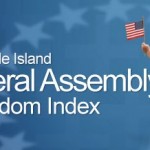Our land, our rights, our local government
Originally published in the Providence Journal, October 20, 2014
– Read Governor Chafee’s OpEd Response
– Center/Stenhouse Response – Related Media Release
See public comment letter submitted by the Center
The American Dream once meant ownership of land and a home, with a white picket fence around the yard, as a symbol of independence and a step toward prosperity. To others today, that dream is being reduced to living in a multi-use tenement building, with a rail around a small balcony, in a socially-engineered collectivist society.
It was the design of our nation that each state should be an independent laboratory, largely free of centralized control. It is widely held that local government is better government — most reflecting the will of the people it serves. Similarly, it is understood that land-use and zoning decisions are best made by locally elected officials. These core principles are the basis of our American society.
Urban planning can be an effective tool in providing for growth of population and services, in maintaining these core principles, and in advancing local values and traditions. Conscientious planners should attempt to balance public benefit against potential loss of property rights. To manage these issues, we understand that related decisions are best made by local officials, accountable to their community.
However, the federal government has recently been pushing and funding a centralized approach, often referred to as “sustainable development.” In creating regional planning entities funded by federal grants, and run by unelected ideologues accountable to no one, this approach turns the local planning process on its head.
In 2012, Rhode Island became the first state to formally cede a major portion of its economic development and planning rights to the federal government when it accepted grant funds from the Department of Housing and Urban Development to create a so-called economic development plan that advances a “social equity” agenda that considers private-property ownership to be unfair. This agenda incorporates radical elements from the environmentalist and “social justice” movements, even to the extent where racial quotas could be implemented to determine who will be allowed to live in certain cities and towns.
In the Ocean State, a little-known plan is being aggressively advanced behind the scenes: It is called RhodeMapRI. While its cozily worded claims of benefits may seem attractive, experience with similar plans has shown that serious unintended — perhaps intended — consequences have undermined core principles that Rhode Islanders hold dearly. Urban planning should never supersede the rights of private citizens or the authority of local governments.
The goals of this movement are to force development of high-density “walkable” communities that meet radical social equity standards and that, ostensibly, reduce carbon emissions. By positioning its suggested reforms in attractive “affordable housing,” “social equity” and “environmentally responsible” language, the true intentions of the movement, also called “smart growth,” may severely limit levels of private property ownership and related property rights.
By focusing only on professed benefits, and covering up high costs and many pitfalls, regional sustainable planning acolytes often slip their agendas through, before local officials and residents realize what is going on. It is then often too late to do anything about it. Just Google “Westchester County Agenda 21.”
Among the many unsustainable problems created by RhodeMapRI could be:
•States and counties ceding their sovereignty to federal government agencies.
•Municipalities giving up much local authority to newly created regional non-governmental entities.
•Wasted money spent on an overly-idealistic urban agenda that would further depress our economy.
•Blocking paths to property ownership and infringing on rights of property owners.
•Transportation restrictions discouraging the use of private vehicles.
•Social equity and radical environmentalism as the standards against which future land-use proposals will be measured.
•Over-aggressive affordable-housing mandates that result in reduced and inequitable local property tax levies (as is happening now in Woonsocket and Barrington).
•Oppressive zoning statutes and liberal eminent domain laws that decrease property values.
RhodeMapRI is not an economic development plan. It is a ruse. It is an extreme social-engineering scheme that will serve to throttle economic growth at a time when the Ocean State can least afford it. Property owners, beware.
There are more questions than there are answers about RhodeMapRI and all Rhode Islanders are encouraged to voice their concerns at one of the upcoming public hearings on Oct. 27 and 28.
Who are these people who have written this massive and intrusive plan? Certainly not elected officials from Rhode Island!
For such an elaborate plan that will impact future decades for our state, why just two public sessions in the final week of a major election campaign? What are they trying to hide?
Mike Stenhouse is CEO for the Rhode Island Center for Freedom and Prosperity, a nonpartisan public policy think tank.
Public forums for the RhodeMapRI plan will be held on Oct. 27 at 6 p.m. at the Powers Building, One Capitol Hill, Providence; and Oct. 28 at 6 p.m. at North Kingstown Senior Center.


Leave a Reply
Want to join the discussion?Feel free to contribute!